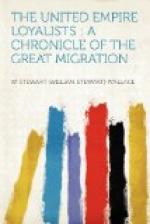Simcoe believed that there were still in the United States after 1791 many people who had remained loyal at heart to Great Britain, and who were profoundly dissatisfied with their lot under the new American government. It was his object to attract these people to Upper Canada by means of his proclamations; and there is no doubt that he was partly successful. But he also attracted many who had no other motive in coming to Canada than their desire to obtain free land grants, and whose attachment to the British crown was of the most recent origin. These people were freely branded by the original settlers as ‘Americans’; and there is no doubt that in many cases the name expressed their real sympathies.
The War of the Revolution had hardly been brought to a conclusion when some of the Americans showed a tendency to migrate into Canada. In 1783, when the American Colonel Willet was attempting an attack on the British garrison at Oswego, American traders, with an impudence which was superb, were arriving at Niagara. In 1784 some rebels who had attempted to pose as Loyalists were ejected from the settlements at Cataraqui. And after Simcoe began to advertise free land grants to all who would take the oath of allegiance to King George, hundreds of Americans flocked across the border. The Duc de la Rochefoucauld, a French emigre who travelled through Upper Canada in 1795, and who has given us the best account of the province at that time, asserted that there were in Upper Canada many who falsely profess an attachment to the British monarch and curse the Government of the Union for the mere purpose of getting possession of the lands.’ ’We met in this excursion,’ says La Rochefoucauld in another place, ’an American family who, with some oxen, cows, and sheep, were emigrating to Canada. “We come,” said they, “to the governor,” whom they did not know, “to see whether he will give us land.” “Aye, aye,” the governor replied, “you are tired of the federal government; you like not any longer to have so many kings; you wish again for your old father” (it is thus the governor calls the British monarch when he speaks with Americans); “you are perfectly right; come along, we love such good Royalists as you are; we will give you land."’
Other testimony is not lacking. Writing in 1799 Richard Cartwright said, ’It has so happened that a great portion of the population of that part of the province which extends from the head of the Bay of Kenty upwards is composed of persons who have evidently no claim to the appellation of Loyalists.’ In some districts it was a cause of grievance that persons from the States entered the province, petitioned for lands, took the necessary oaths, and, having obtained possession of the land, resold it, pocketed the money, and returned to build up the American Union. As late as 1816 a letter appeared in the Kingston Gazette in which the complaint is made that ’people who have come into the country from the States, marry into a family, and obtain a lot of wild land, get John Ryder to move the landmarks, and instead of a wild lot, take by force a fine house and barn and orchard, and a well-cultivated farm, and turn the old Tory (as he is called) out of his house, and all his labor for thirty years.’




